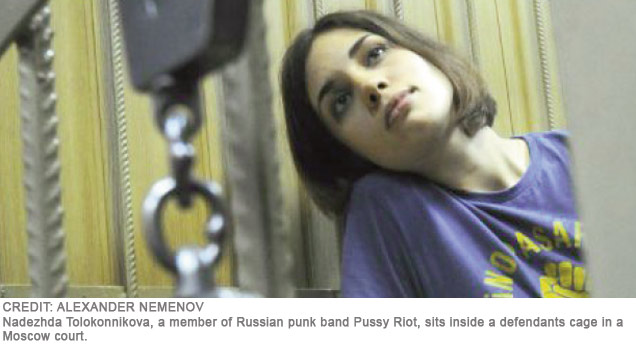Notes From Day Seven: Pussy Riot, the Church and the real Jesus

A small number of Fanshawe students have helped put the college on the map. Many will remember last March's St. Patrick's Day riot when, according to reports, not only was a CTV news van overturned and set afire, but 17 police vehicles were damaged. At one point, the rioters could claim credit not only for setting explosions, but for driving away the police who had come dressed in riot gear to calm them.
Over in one of the neighbouring provinces, other students have been taking to the streets for more noble reasons: they've been crying out in protest against Quebec's tuition increases, and, they claim, against threats to freedom of speech and expression. This in spite of the fact that Quebec's tuition is about the lowest you can get in the country, and that students have been marching week after week, at times in their underwear.
A little further away, the cries of students and young people are of greater concern. Many Russian young people are distressed about the oppressive tendencies in their country. Pussy Riot, the punk band whose members this past week were sentenced to two years in Siberian detention, have found many fans who embrace their message. The band challenges the traditional roles of women, the totalitarian habits of Russian government and the traditional connection between the state and the Russian national church, the Orthodox Church.
All of this came together in the now famous performance by the band in Christ the Saviour Cathedral in Moscow last February. Video of the performance isn't all that provocative to many of us who've seen images and heard lyrics that are much more extreme. However, as protest art, the high kicking and the lyrics were very clever and effective. The three lead members of the band called upon the Virgin Mary to save Russia from Vladimir Putin, who has since been chosen again to be the president of the country.
Church officials, maybe, are trying to be understanding. They are asking for mercy for the convicted singers. Mercy, however, “within the limits of the law.” If that seems a bit lacking in courage, we can understand why. The Russian Orthodox Church feels that it represents the whole of Russia and that it has a special relationship with the ruling authorities. According to the National Post, Tikhon Shevkunov, believed to be President Putin's spiritual advisor, said on state television that “his church forgave the singers for their ‘punk prayer.'” Nevertheless, the “prayer” was considered an act of sacrilege and the church hopes that the singers will change their ways.
Now, it is possible that the church had something to do with the two-year sentence that in Russia is believed to be quite lenient. As has been reported, many Russians, especially those who live in the countryside, are devout members of the Orthodox Church and church leaders could have fanned the flames of anger against the singers.
Nevertheless, I wonder if the Russian Orthodox Church isn't missing an opportunity to connect with young people who are crying out for greater levels of justice and healing, not only in Russia, but elsewhere. Along with you, I don't live in Russia. But I wonder if the voices in the Orthodox Church couldn't be a little less supportive of Russia's chosen leaders — they sometimes refer to Putin as someone chosen by God — and a little more supportive of those, such as students, who are asking for greater freedoms and more justice.
Jesus tended to side with people on the margins: widows fleeced by landlords, lepers consigned to the realm of the “unclean,” sinners who knew they had some things to answer for and women driven into prostitution. Perhaps church leaders (and I include myself here) sometimes hide the real Jesus as much as they reveal him. It would be best, I think, to understand Jesus, not so much as the founder of the institutional church (though obviously there is a connection there) but more as God reaching out to all people, including all students, especially those in trouble.
Oh, and it would also be terrific if no Fanshawe students rioted this academic year.
Michael Veenema was a chaplain at Fanshawe College until 2004. He currently lives in Nova Scotia and continues to write.
Editorial opinions or comments expressed in this online edition of Interrobang newspaper reflect the views of the writer and are not those of the Interrobang or the Fanshawe Student Union. The Interrobang is published weekly by the Fanshawe Student Union at 1001 Fanshawe College Blvd., P.O. Box 7005, London, Ontario, N5Y 5R6 and distributed through the Fanshawe College community. Letters to the editor are welcome. All letters are subject to editing and should be emailed. All letters must be accompanied by contact information. Letters can also be submitted online by clicking here.













